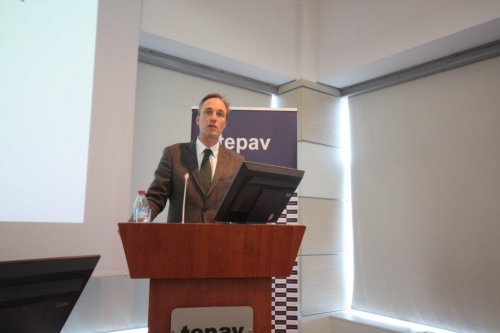Raiser: “The Customs Union needs to be modernized” World Bank Turkey Director Martin Raiser said that the first best solution concerning the Customs Union was progress in the EU accession whereas such solution was not on the table.

ANKARA – World Bank Turkey Director Martin Raiser stated that the Customs Union agreement between the EU and Turkey needed to be modernized with the trade policies across the world have been changing.
The report “Evaluation of the EU-Turkey Customs Union” prepared by the World Bank Turkey Office with the funding of the European Commission was presented with a meeting at TEPAV on Tuesday, 29 April. At the meeting moderated by TEPAV EU Institute Director Nilgün Arısan Eralp, opening remarks were delivered by Janamitra Devan, Adviser to the TEPAV Board of Trustees and Former Vice President of the World Bank Group; and Martin Raiser, the World Bank Country Director for Turkey. The speakers of the meeting were Kamer Karakurum Özdemir, Senior Economist, the World Bank and Prof. Sübidey Togan of Bilkent University.
World Bank Turkey Director Martin Raiser stated that the Customs Union needed to be modernized for three reasons: to preserve what has been achieved so far, for the Customs Union has unfinished potential as it does not cover services and agriculture, and public procurements, and for trade policies across the world have been changing. Stressing that the existing problems had to be solved before widening the scope of the Customs Union, Raiser said, “The first best solution for dealing with irritants would be progress in the EU accession. But the first best solution may not be immediately on the table.”
Janamitra Devan, Adviser to the TEPAV Board of Trustees, underlined that the Customs Union had been a major instrument of integration of the Turkish economy into the EU and global markets, offering powerful tool of reforming the economy and institutions. Devan said that the key question was where Turkey went from this point. Stating that the Customs Union needed to be revised particularly in the context of the free trade agreements (FTAs) the EU concludes with third countries, Devan accentuated that Turkey’s primary issues in competitiveness went beyond trade agreements.
Delivering a short speech following the opening remarks, Nilgün Arısan Eralp stressed that the Customs Union had started to lose its advantage for both Turkey and the EU due to globalization, EU enlargement towards eastern Europe, the exclusion of services, unprocessed agricultural products, and public procurements, the increasing role of FTAs for the EU, and growing transportation quotas and visa obstacles.
Kamer Karakurum Özdemir, presenting the findings of the study, primarily stressed that the Customs Union was more advantageous than a FTA for both parties. Drawing attention to the potential for larger integration, she stressed that widening the agreement to agriculture could bring Turkey a welfare gain of up to US$ 840 billion. Özdemir stated that losses from employment could be balanced with gains in productivity. According to the study estimates, Özdemir said, static gains of opening services trade would worth US$ 1.1 billion. Özdemir later summarized recommendations of the report for maximizing the gains:
- Reducing asymmetries in the decision making process
- Formalizing parallel negotiations for FTAs
- Green lane for visas for pre-qualified Turkish professionals
- Liberalizing road transport permits on trade covered by the CU
- Better coordinating before Trade Defense Instrument investigations launched
- Widening preferential trade to primary agriculture and services
- Strengthening dispute settlement
- Increasing transparency in Turkey’s transposition of the acquis
Prof. Dr. Sübidey Togan focused on the problems with integration in agriculture and services trade in the context of global production changes, and “mega FTAs” Transatlantic Trade and Investment Partnership and Transpacific Partnership. Stressing that failure to adapt to these FTAs would negatively affect Turkey’s trade performance and potentially bring welfare losses, Togan said Turkey could avoid these risks by concluding a FTA with the EU or widening the Customs Union to cover agriculture and certain services sectors.
“Please click here to reach the report “Evaluation of the EU-Turkey Customs Union”














